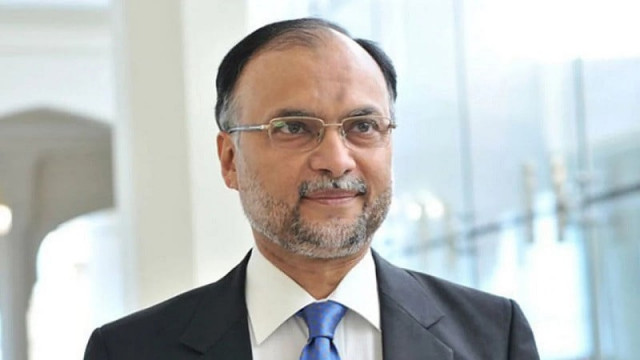Islamabad:
Planning Minister Ahsan IQBAL said Thursday that Prime Minister Shehbaz Sharif has constituted an investigation commission to take legal actions against those responsible for the collapse of the tunnel in the Neelum-Jelum Hydrovopter project of RS500 billion (NJHP).
Speaking at a press conference, Iqbal said that the commission, headed by a retired judge, was formed on the basis of conclusions of two separate committees. He added that the commission will listen to those involved before initiating legal procedures.
According to the terms of reference (Tor), the Commission will recommend legal, administrative and financial actions against those responsible. Classify responsibility as serious negligence, procedural misconduct or possible criminal responsibility as the case may be, read a notification.
Iqbal described the NJHP failure as an “expensive and evident error.” He said that the restoration of the 969 megawatt project that has been closed since May last year, was not yet in sight since the Authority for Water and Power (WAPDA) had not yet presented the PC-I for revival.
In May of this year, the Minister of Water Resources, Muhammad Moeen, had informed the National Assembly that the NJHRP restoration process was expected to take two additional years to complete.
A few months ago, Wapda had proposed to the government that the tunnel should be rebuilt with an estimated cost of RS250-300 billion or should be repaired by spending around RS20 billion. The Government had also hired an International Panel of Experts (IPOE) to investigate the structural problems that affect the project main race tunnel (HRT).
The panel had the task of identifying the causes of recent challenges. The report highlighted the areas of the tunnel floor that required attention, together with recommendations for greater ventilation, lighting and workers’ safety measures.
In May of this year, the Federal Cabinet approved to establish an investigation commission under the Law of the 2017 Pakistan Research Commission, to investigate the NJHP.
Justice (RETD) Tariq Abbasi is the president of the Investigation Commission, who has time until August 20 to finish his report, according to the notification. Other members include Shahid Khan and the Division of Establishment Secretaries, Water Resources Division and Pak Army Chief Engineer.
The tors of the commission imply a sequential analysis of all key decisions in planning, design, execution and monitoring; Establish a clear responsibility for omissions, delays and erroneous judgments that led to the collapse of the tunnel.
The Commission has been in charge of verifying compliance with engineering standards, project management protocols and the Directives of the Executive Committee of the National Economic Council (ECNEC) and the Central Development Work Party (CDWP) and other regulatory agencies.
It is required to identify responsible persons and determine if the failures in geological evaluations, the tunnel lining and water pressure management resulted in negligence, incompetence or deliberate behavior, linking specific lapses with the responsible officials.
The commission is evaluating the role of supervision agencies, consultants and contractors to identify failures in risk mitigation, contractual obligations or deceitful guarantees and the fixation of responsibility accordingly.
At the press conference, Iqbal also talked about the predominant economic conditions and the achievements of this government in the last year. He said that the Government successfully reduced inflation to an average of 4.5%, the lowest since 2016.
“The effective fiscal consolidation and stability of the external sector underline the strongest recovery trajectory of Pakistan of Pakistan, he said, adding that economic performance reflected prudent economic management and increasing signs of confidence in Pakistan’s ability to navigate external shocks and maintain a path to stability and inclusive growth.
To a question about the inability of the government to meet the investment objectives, the minister said that investors were concerned about macroeconomic stability and the judicial challenges of Pakistan. He added that after bringing political and economic stability and making constitutional changes through the 26th amendment, investors confidence has been restored. He expressed the hope that foreign investment began to resume this fiscal year.
Pakistan’s macroeconomic performance in fiscal year 2015 demonstrated resilience despite the winds against global, with a growth of GDP increasing to 2.7% and inflation falls considerably to an average of 4.5%, reads the development update report that the Ministry of Planning launched on Thursday.
He added that the strategic approach of the Government in high -impact, inclusive and led exports projects under the PSDP aligns with the priorities of “Uraan Pakistan”, emphasizing exports, digitalization, green growth, energy safety and social equity.




